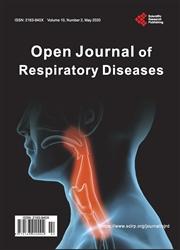Assessment of the Quality of Life of Patients with Mycobacterial Pulmonary Diseases
引用次数: 0
Abstract
Introduction: Mycobacteria pulmonary diseases are chronic illnesses with various impacts on patients’ health status, and wellbeing. These diseases currently represent a global health issue due to increasing burdens and the lack of new development on therapeutic options. Policies based on the quality of life may help to improve the management of this chronic respiratory disease; this study was designed to assess the quality of life of patients treated for the pulmonary mycobacterial disease. Materials and Methods: Participants diagnosed with a mycobacterial pulmonary disease were selected from the University Clinical Research Centers’ (UCRC) 2019 mycobacterial cohort database. A telephone interview was conducted using the Medical Outcome Study Short Form (SF-36) which has 36 items evaluating physical and mental wellbeing. Scores range from 0 - 100, with higher scores indicating greater Health-related quality of life (HRQOL). Statistical analysis was performed with SPSS 23.0 and the Fisher test was used to compare percentages. A p-value less than 0.05 was considered significant. Results: A hemoglobin was 11.8 ± 2.2 g/dl. The mean SF-36 score was 75.1 ± 16.6, and impairment was mainly related to mental problems in 59.6%. The mean total score was significantly lower with age more than 42 years than age less than 42 years. But HIV positive and BMI less than 18.5 do not lead to a significant change of mean total score. Conclusion: Patients with mycobacterial pulmonary diseases have more psychological problems than physical ones. Hence the importance of psychological support in their management to improve their quality of life. A large sample size with a deep interview component would be necessary to address limitations in this design.分枝杆菌性肺部疾病患者生活质量的评价
简介:分枝杆菌肺病是一种慢性疾病,对患者的健康状况和福祉有各种影响。由于负担日益加重和治疗方案缺乏新的发展,这些疾病目前是一个全球性的健康问题。以生活质量为基础的政策可能有助于改善这种慢性呼吸道疾病的管理;本研究旨在评估接受肺分枝杆菌疾病治疗的患者的生活质量。材料和方法:从大学临床研究中心(UCRC) 2019分枝杆菌队列数据库中选择诊断为分枝杆菌肺病的参与者。使用医学结果研究简表(SF-36)进行电话访谈,其中有36个项目评估身心健康。得分范围从0到100,得分越高表明健康相关生活质量(HRQOL)越好。采用SPSS 23.0进行统计分析,采用Fisher检验比较百分比。p值小于0.05被认为是显著的。结果:血红蛋白为11.8±2.2 g/dl。SF-36平均得分为75.1±16.6分,59.6%的患者主要与精神问题有关。年龄大于42岁者的平均总分明显低于年龄小于42岁者。但HIV阳性和BMI小于18.5并不会导致平均总分的显著变化。结论:肺分枝杆菌病患者心理问题多于生理问题。因此,心理支持在其管理中的重要性,以提高他们的生活质量。为了解决这一设计的局限性,有必要采用大样本和深度访谈。
本文章由计算机程序翻译,如有差异,请以英文原文为准。
求助全文
约1分钟内获得全文
求助全文

 求助内容:
求助内容: 应助结果提醒方式:
应助结果提醒方式:


